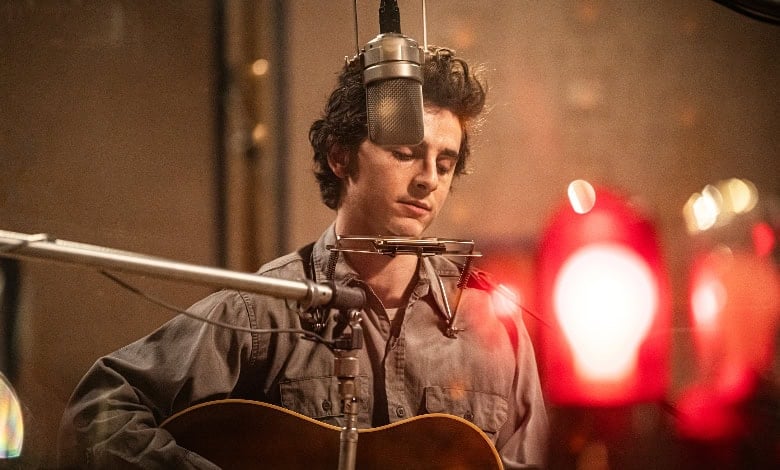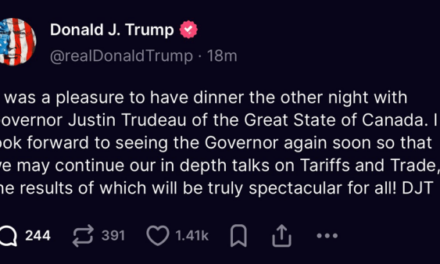We support our Publishers and Content Creators. You can view this story on their website by CLICKING HERE.

James Mangold’s “A Complete Unknown” is one of those musical biopics that gives you what you expect, if not demand, but also manages to be better than the formula typically allows.
What formula am I referring to?
The one where we meet our down-and-out musician who gets an opportunity to shine before a potential handler (cue the wide-eyed reaction shots of the soon-to-be-manager), followed by rehearsal and concert montages, the second act blow-ups and screaming matches, followed by the third-act redemption, which usually takes place on stage in front of hundreds of screaming fans.
Don’t forget the self-conscious dialog that arrogantly points to the future (example: “You’ll never amount to anything, not with a name like that…DAVID BOWIE!”) and already sounds like the inevitable “Saturday Night Live” parody to come.
I am so sick of these movies.
The thing about most music bios, particularly those made during the past 25 years, is how the majority are based on the lives of artists who are still alive, have joined the project as a producer and can dictate the direction of the film. Hence, a lot of these films are watered down and fairly generic.
Not all of them, to be fair, but many of them are promo pieces for the soundtrack and disposable as TV-movie level dramas. Yes, you get a great soundtrack and a showcase for a lead performer who can impersonate (and usually lip synch) like a pro, but there’s a sameness to so many of these movies.
Then there’s “A Complete Unknown,” which somehow adheres to the formula and expectations of The Bob Dylan Movie but doubles down on the music, the unflattering details and the artist’s stubborn belief in his art.
The result is a film that feels less like it’s ready for VH1 than something as exhilarating, unflattering and refreshing blunt as the best of these kinds of films (more on them later).
We meet Timothee Chalamet’s Dylan as he hitchhikes into town and heads to the hospital to visit his ailing musical hero, Woody Guthrie (Scoot McNairy). In the presence of Guthrie and his friend/folk singer Pete Seeger (Edward Norton), Dylan plays Guthrie a song he wrote about him.
Chalamet’s rendering of the tune (as well as a pitch-perfect take on Dylan), the understated way the actors play it, and Mangold’s staging announces this will not be a typical “Behind The Music” movie.
Dylan’s slow ascent, random encounters and growth as a songwriter/artist make up most of the narrative, which halts every few minutes to play a knockout tune and add another quirky touch to Dylan’s legend.
Essentially, even though he has presented various versions of himself and his artistry (something Todd Hayne’s weird but fascinating 2007 “I’m Not There” explored), Dylan is unknowable. Mangold and Chalamet seem aware of this and give us a poet and maestro whose music spoke to a generation, even as the man behind them could be aloof or, as presented here, off-putting and self-centered.
I love Mangold’s first two films, “Heavy” (1995) and “Copland” (1997) and recognize his depiction of Dylan being akin to the awkward, soulful outsider protagonists of those films. Mangold course-corrects himself after his successful but overpraised “Walk the Line” (2005), the Joaquin Phoenix/ Reese Witherspoon led drama about John and June Carter Cash that is respectable but so generic, the inspired parody “Walk Hard: The Dewey Cox Story” (2007) spoofed it and just about every cliché in the genre that proceeded it.
Mangold’s latest isn’t a definitive Dylan film, though, outside of maybe D.A. Pennebaker’s 1967 “Don’t Look Back” documentary (I say maybe because even that film isn’t the whole story), I doubt such a film is possible. “A Complete Unknown” fails to probe Dylan’s psyche (learning who is the Real Dylan is probably impossible, if the interviews are any indication of how he keeps his enigmatic mystery intact).
Is there a Definitive Dylan Movie at this point? I’d say it’s probably the bizarre, rambling and fascinating “Masked and Anonymous” (2003), with its all-star cast, dreamlike take on a post-apocalyptic world and positioning Dylan as the star, a man who has the answers for a fallen world. Dylan also co-scripted it.
I’m not saying “Masked and Anonymous” is good, only that I’ve never forgotten it and, as notable bad movies go, it’s worth seeing at least once.
In terms of the most visible missteps in “A Complete Unknown,” Dan Fogler’s broad, “SNL”-ready performance as Dylan’s manager is a big distraction. The scenes of Dylan’s long-suffering girlfriend (Elle Fanning) are overly familiar.
Like Oliver Stone’s “The Doors” (1991) it’s overlong, occasionally loses focus by trying to cover so much ground and, during the second act, it’s sometimes too much but not enough (Wait, who was Dylan dating in that one scene, who he sent walking home two minutes later? Did that keyboardist really nail the “Like a Rolling Stone” intro by sheer accident?!).
Yet, like “The Doors,” it centers around a towering lead performance, provides a young audience to bask in so much great music and so many great scenes to pull you back in whenever the film threatens to become unfocused.
Dylan is still with us, and his legacy has some remarkable, mystifying and still-unexplored career turns that could probably fill another documentary. Mangold was wise not to cram in everything and just focus on the time Dylan became Dylan…the first time.
The exceptions to this genre are “What’s Love Got to Do with It” (1993), “La Bamba” (1987) and “The Doors” (1991). The rest? Most rock bios are more soundtrack promo than substance (Exhibit A: “Rocketman,” “Bohemian Rhapsody,” etc.).
Mangold and Chalamet’s performance make us understand why Dylan challenged and inspired the counterculture, 20th century musicians and everyone that came after.
“A Complete Unknown” roughly covers the first few years of Dylan’s legendary career, which Mangold depicts in as straightforward a manner as possible. When Chalamet is in profile, it feels like the movie is pausing to be iconic…which it earns, because, whether in profile or filmed straight on, I kept forgetting I was watching Timothee Chalamet.
Here’s another amazing thing about Chalamet- the end credits reveal he sang the long list of Dylan songs himself. Likewise, Norton. What an undertaking and achievement for a film actor.
Norton gives the kind of warm, endearing turn he typically reserves for Wes Anderson. Monica Barbaro gives a knockout turn as Joan Baez, a scene-stealing Boyd Holbrook nails the edge and pull of Johnny Cash (yes, I liked his take on the man better than Phoenix’s), and, at the center, is the moving turn by McNairy as Guthrie.
If you’re not a fan of this music or never heard it, I suspect the film will win over the uninitiated and create new fans.
What is Mangold’s secret to making this movie soar as high as it does? Rather than drown his audience in anecdotes and music bio formula, he bludgeons us with brilliance – Chalamet’s amazing performance, some of the greatest songs ever recorded and so many great scenes and supporting performances.
They collectively elevate this over so many 2024 event films.
Three and a Half Stars

 Conservative
Conservative  Search
Search Trending
Trending Current News
Current News 





